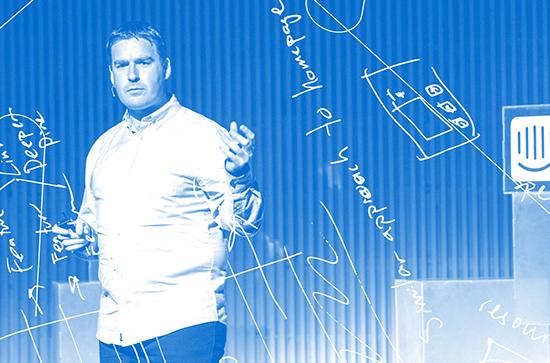
Inside the Ascent of Intercom, with Co-Founder (and Maynooth University alumnus) Des Traynor '03
By Rebecca Doolin
Shelving his PhD work for a day turned out to be the biggest decision of Des Traynor’s life.
Fast forward a few years and Intercom is a tech company that is transforming the way businesses communicate with their customers. Their model is to eliminate the multiple platforms through which a customer connects with a company, and vice versa—whether it be sales, marketing or customer service—by using singular technology that feels like a messaging app you could be using everyday on social media or on your smart phone.
Intercom’s stock has risen (figuratively, the company hasn’t gone down the IPO route, yet) at a precipitous rate. But the ultimate question every fourth-year Computer Science student is wondering: How did they do it?
“You get a reasonable opportunity to reinvent yourself that you don’t get when you follow other people where they’re going,” Des said. “I was also attracted by the Computer Science and Software Engineering programme at Maynooth because it was very, very, very hard. It appealed to me to go somewhere where I knew I’d be tested.”
He was, and built his technical skills while also building a network of like-minded techie students who spent out-of-class time hanging out, chatting on servers, and taking on projects through the Maynooth Information Network Development Society (MINDS, now known as SocIT), started by Cian Synnott ‘03. It was at Maynooth, and through MINDS, that Des built a friendship with David Barrett ’03, who would go on to help found Intercom with Des and to Trinity alumni, McCabe and Ciarán Lee. Today Barrett is a senior engineer at the company.
It turns out blogging helped connect Des and Eoghan at the coffee morning. “He had a blog. I had a blog.” So the two team up to build an error-tracking tool for software developers called Exceptional. The company tallied thousands of users but ran across a problem: it had no way to talk to them. A side project ensued and the quartet of Intercom co-founders built a chat tool whose popularity quickly outstripped that of Exceptional. By 2011, the four were courting venture capital in Silicon Valley and on August 15, 2011, Intercom was incorporated. Seed funding of €1M was secured, and quickly grew to €6M, then €23M and a few years later, €116M. The road ahead is limitless for a company like Intercom, whose pitch to simplify the customer communication experience is paramount in today’s digital commercial age.
To do this, Des, as Chief Strategy Officer and Vice President of Marketing, is building his brand and his user base—by returning to the principles of blogging and teaching, but bringing them to global scale, and with the signature flare of Silicon Valley. He’s just completed a 10-city World Tour of Intercom events, which are billed more like the “gig you can’t miss” than any sort of dry corporate workshop. Case-in-point: The tour wrapped up at Vicar Street in November. BUILDING INTERCOM: An evening of engineering stories about building, scaling and taking risks with our product. The concert-level hype helps Des build a following as well as a brand, sharing lessons learned with crowds of college students and start-up techies hoping to be the next Des Traynor.
No, that’s not up for debate. In fact, behind the hype and the business success is a desire—an imperative even—to recognise the power that comes with a voice that Intercom has achieved and use it for good when possible. In January 2017, immediately after President Donald Trump announced a ban on travel into the US by several majority-Muslim nations, Intercom used its blog to make a statement that reverberated throughout the industry. In the post titled, “Supporting our Muslim brothers and sisters in tech,” McCabe wrote, “We feel compelled as humans to see if we can try to ease the new suffering of some, by even a small amount. And as immigrants ourselves, we’d also like to make a statement on the topic. We abhor this and any policy of hate and discrimination.”
In general, Des is pleased when the tech industry finds common voice on such issues and eschews the cynics who say, “That’s the least they can do.”
Straddling the two worlds of “the Valley” and Dublin is something Des is well accustomed to, spending one-third of his time in San Francisco and two-thirds in his native Castleknock. Newly married, he’s a man living two lives in many ways: “I have friends in both cities, clothes in both cities, follow politics and events in both cities. It’s not two identities, but feels close sometimes.”
The pace, however, is not likely to abate anytime soon. As Intercom continues its ascent into the tech stratosphere, its strategy is to build more software and hire more people—in other words, grow.
“The road ahead is clear,” he said. “It’s the velocity and amount of people required that’s the challenge.
